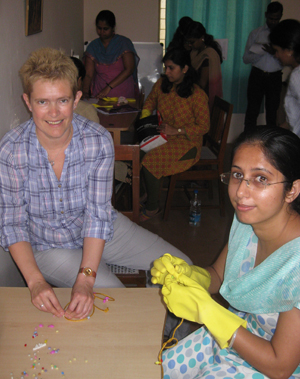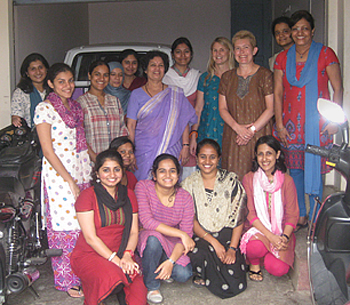Autism in India
Mon, 15 Oct 2012 12:55:00 BST
Huddersfield lecturer helps to train the sub-continent’s therapists
 INDIA is determined to develop a new and effective strategy to help children diagnosed with disorders such as autism. And the expertise of University of Huddersfield senior lecturer Helen Ribchester (pictured left with an Indian therapist) has been harnessed for a major project launched on the sub-continent.
INDIA is determined to develop a new and effective strategy to help children diagnosed with disorders such as autism. And the expertise of University of Huddersfield senior lecturer Helen Ribchester (pictured left with an Indian therapist) has been harnessed for a major project launched on the sub-continent.
She has spent an intensive three weeks in the city of Bangalore, helping to train therapists from all parts of the vast country and she hopes to return for a follow-up visit.
Meanwhile, her Indian venture has given Helen fresh perspectives for her teaching on the University of Huddersfield’s BSc course in Occupational Therapy – and the very experience of visiting a bustling Indian city gave her an extra insight into the minds of autistic youngsters as they attempt to make sense of the world around them.
Helen’s visit to India was organised by the UK charity MAITS (Multi-Agency International Training and Support), which sends experienced professionals overseas to help with new services that are under development.
In India, a programme named Communication DEALL (Developmental Eclectic Approach to Language Learning) has been launched in response to concern over the increasing numbers of children identified with developmental language disorders. Helen volunteered and was recruited to train a team of Indian therapists in a technique known as sensory integration.
“In order to function normally,” she explains, “we have to be able to take in lots of information and make sense of it so that we can respond to our environment. This includes not only our senses but also our sensations of movement and the understanding of where our body is in space.
“Autistic children don’t integrate that information terribly well. They are getting too much information, so that they are overloaded and they can’t actually process it. A busy school environment can be quite traumatic for a child with autism. They won’t necessarily filter out those sensory inputs in the way that the rest of us do automatically.”
The theory behind the therapy named sensory integration is that strategies can be developed to help an autistic child. Trained specialists work alongside parents to tailor the individual approach.
A Vivid Insight
Arriving in India provided Helen Ribchester with a vivid insight into the disorder that is her speciality.
“It is total sensory overload when you land in Bangalore! For example, in this country we are programmed that if you hear a car horn you look, because it signifies danger. But in India, if you look every time there is a car horn you can’t actually walk down the street in a straight line! Things like that affected my sensory integration, which was great because it helped focus on what I was teaching.”
 In Bangalore, she was training people who had a good theoretical knowledge of sensory integration but were used to a more formal, didactic style of teaching. Instead, Helen adopted a workshop approach. (as seen pictured right with workshop participants)
In Bangalore, she was training people who had a good theoretical knowledge of sensory integration but were used to a more formal, didactic style of teaching. Instead, Helen adopted a workshop approach. (as seen pictured right with workshop participants)
“It was practical, experiential-style learning and they threw themselves into with great enthusiasm.”
There is still stigma attached to autism in India and parents often find it difficult to accept the diagnosis, said Helen. But attitudes are changing and she is pleased by the role she has been able to play.
“I’m keeping in touch and there are plans to return and review the scheme. I would be more than happy to go back!”
Read Helen’s blog of her Indian experiences at http://blogs.hud.ac.uk/subject-areas/out-there/about/







